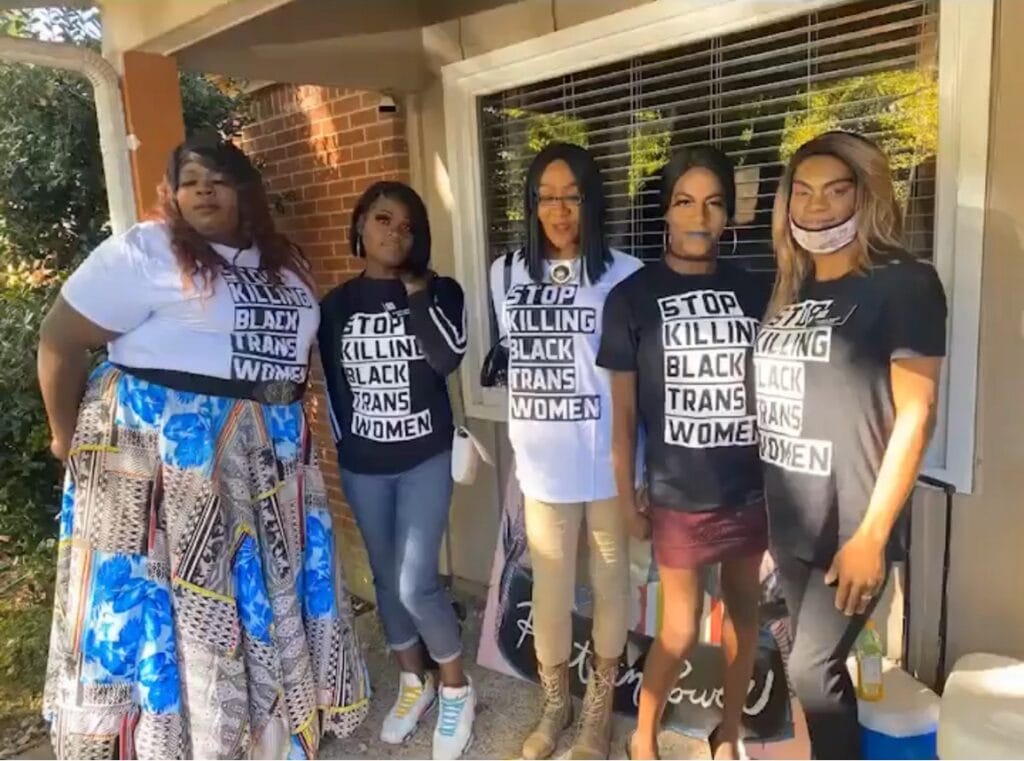By Dionne N. Walker
Imagine it: A youthful attempt at making fast money launches a chain of events that leaves you homeless a decade later—with no hope of ever getting out. In 2012, Michelle Anderson didn’t have to imagine it.
Within five years, the Memphis woman had gone from a bright-eyed, ambitious college student to an on-again-off-again sex worker with an arrest record and an HIV diagnosis. 2012 also delivered a brutal blow — a prostitution conviction which, due to Tennessee’s strict laws regarding people living with HIV who are convicted of sex work, landed her on the violent sex offenders list and in a world of rejection from renters and employers alike.
“This is something I’ve been dealing with for the past almost 10,12 years,” says Anderson, who only recently secured permanent housing after years bouncing from place to place.
Tennessee is the only state in the nation that requires lifetime registration as a violent sex offender if convicted of engaging in sex work while living with HIV. While the “aggravated prostitution” law doesn’t explicitly target LGBTQ persons, insiders say it disproportionately affects transgender women in a region where fear and outright discrimination push many out of the job market and into a cycle of homelessness and survival sex.
At least 154 people living with HIV have been placed on Tennessee’s sex offender registry and deemed violent sexual offenders for charges stemming from their status, according to a June 2022 report by the Williams Institute at the University of California Los Angeles. More than two-thirds of U.S. states and territories have enacted HIV criminal laws, which do not reflect modern scientific advancements or an evolved understanding of HIV as a preventable virus that, if acquired, can be treated to the point of undetectable.
But activists are fighting back. They’re partnering with national nonprofits to end what they say is blatant discrimination. Their efforts are gaining traction: In February, The U.S. Department of Justice filed a lawsuit against the state of Tennessee and the Tennessee Bureau of Investigation (TBI) for violating the Americans with Disabilities Act (ADA). The decision followed an October lawsuit filed by the American Civil Liberties Union and Tennessee HIV activists.
But insiders say it may be a long time before the state is forced to comply. In the meantime, they worry how many more people like Anderson may fall through the cracks.
“Suing them in federal court to get this changed… that’s going to drag on,” says Robin Lennon-Dearing, a University of Memphis professor and co-founder of the Tennessee HIV Modernization Coalition. The grassroots group has worked with other organizations to overturn Tennessee’s criminal exposure law, which made it a crime to expose a person to HIV in general.
“In the meantime, people are living every single day with this hanging over their heads,” she says. “It’s like a permanent scarlet letter.”

For Anderson, it has meant never getting too comfortable in a job or a home. During the pandemic, she earned a harsh reminder when her landlord sold his property to a rental company that insisted on background checks for existing residents.
“The rental company denied my application,” she says. “They didn’t want to have anyone on the registry in the housing.”
Born and raised in what she describes as “small town Mississippi,” Anderson says she never considered sex work until her plan to launch a career in Memphis fell through. Before long, she entered a cycle of legitimate work, job loss, and sex work to survive.
“I still had to pay bills, put gas in my car, [and do] all this other stuff. I just ended up going back to what I knew,” she says. “It was survival sex, and a lot of people got caught up.”
Little Change, Big Impact
Unsurprisingly, prostitution has long been criminalized as a misdemeanor in Tennessee. But a change in the early ‘90s converted state prostitution law into a juggernaut that would impact the lives of transgender people for decades to come.
Pushed by nationwide panic in 1991, when the HIV/AIDS epidemic was in full swing, Tennessee lawmakers enacted HIV criminalization laws. By 2010, the laws were strengthened to charge those prostituting while living with HIV, as well as those believed to have exposed others to the virus, with a “violent sexual offense” requiring a person convicted to register as a sex offender for life.
Being on the registry subjects offenders to a lifetime of monitoring and restricts them from living within a set distance from schools, churches, and other places where children often gather. The registry is also public.
In a Bible Belt state where churches are on nearly every corner, advocates say this can equal a lifetime of housing insecurity. Lennon-Dearing first became aware of the law’s impact while facilitating an HIV support group in 2016.
“Several women said they were on the sex offender registry,” says Lennon-Dearing, who was surprised. “They had gotten arrested for aggravated prostitution, and that really just culminated in them having to go to jail and get out and be on the sex offender registry.”
Advocates say part of the problem is that people embarrassed and eager to get out of trouble with the law often plead guilty to the charge, not understanding the implications of being added to the registry.
Initially, Lennon-Dearing thought a few visits to the statehouse would overturn the law. Some eight years later, however, Tennessee remains unique in its strict HIV criminalization laws for reasons she says range from statehouse politics to lack of personal awareness.
“I don’t think people in the legislature know people living with HIV, so they don’t see them as people,” she says. “They want to be seen as tough on crime.”
Collateral Damage
In Memphis, being “tough on crime” has had a devastating impact on trans women.
While the law itself doesn’t explicitly target transgender people, insiders say its focus on HIV and sex work—in a high-risk region that still locks many trans people out of the mainstream workforce— all but ensures that transgender people are disproportionately affected.
A recent study by the Centers for Disease Control found that as many as four out of 10 transgender women living in seven major cities were living with HIV.
Anderson had just finished her first year as a business administration student at Ole Miss when, around 2007, she became disenchanted with school.
“I was just going to school because my mom said I had to go,” she says.
Anderson had a family member in Memphis and figured a stint in the flashy, musical city would beat another year at college. So she moved, got a seasonal job, and thrived for a while.
But then the job ended. Unemployment benefits were slow coming. Meanwhile, Anderson had just begun her transition in earnest.
“Trying to go out how I present myself and how I feel, as I am, became no one’s going to hire me,” Anderson says. “Then I ended up meeting someone who convinced me – I know how you can make some money.”

It’s a sad but common experience, according to Kayla Gore, executive director and founder of My Sistah’s House in Memphis. Since 2016, Gore has worked almost exclusively with trans folks with a history of sex work and housing insecurity. The group started working with other local organizations to provide temporary shelter; in 2021, organizers launched a program to renovate and build more permanent tiny houses for clients. So far, organizers have constructed or renovated eight homes ranging in size from 400 sq ft to 800 sq ft, she says.
“The smaller we build, the less it costs to build and the more homes we can build,” Gore says. “We definitely wanted to make sure that people had something more sustainable than just the transitional housing.”

A trans woman herself, Gore knows the pressures other trans people in Memphis face firsthand.
“If you back up ten years ago, I was homeless,” she says.
Gore had moved out to Phoenix for a job that ultimately fell through. After a few months of homelessness in Arizona, Gore returned to her hometown of Memphis and immediately looked for a job.
Things went well—at first.
“Once I started presenting as a transwoman, there were issues,” she says. “I was asked to leave transitional housing.”
Employers, meanwhile, were equally reticent.
“A lot of people are cut out of economics due to them being trans, whether that’s due to their own personal insecurity or whether they’re going places and people are saying ‘Get out,’” she says, adding those with jobs aren’t often secure. “A lot of people lose their jobs because they transition.”
Gore herself dabbled in sex work before she was able to secure a job at an LGBTQ- friendly community center and connect with a nonprofit to help find a home. But even then, Gore says her lack of rental history and issues with her name change slowed down the process. My Sistah’s House works closely with transwomen to ensure they don’t get mired in similar red tape.
“We’re filling the gap because that hiccup that I had is something that would throw other people off,” she says. “A lot of people are just weary of processes not going their way.”
Indeed, Anderson says she’d sunk into depression and intense anger over her inability to flourish.
“I was angry at the law, I was angry at the state – when I wasn’t able to get jobs due to me being on the registry, I was angry about that,” she says. “A lot of stuff just kept piling up.”
Shortly after the pandemic cost her housing, which had taken two years to secure, Anderson crossed paths with Gore.
“It just so happened she was finishing up on a new home that was in compliance with the registry,” Anderson says. “It’s a nice spacious home. I was able to get [everything] situated and move in.”
Fast-forward a few years, and Anderson is thriving. She has kept a stable job and nowadays comes home to a comfy duplex with a spacious backyard and a pond.
And there’s more good news: Recent tweaks to Tennessee law may finally make her eligible to come off the list.
“It’s really been full circle for me, coming from a point of being depressed and desperate about it to being one of the people who are trying to change,” she says. “This is really kind of a whole 180 degrees from what it was to what it is now, and that’s why I don’t mind sharing my story.”













